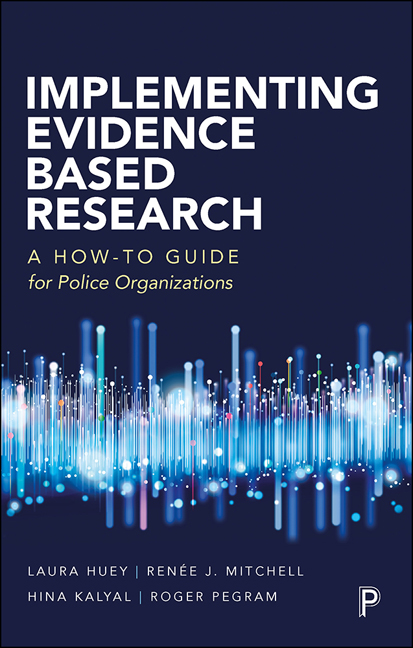Book contents
- Frontmatter
- Contents
- List of tables and figures
- Acknowledgments
- Introduction
- 1 Implementing evidence-based policing
- 2 Situating evidence-based policing
- 3 Understanding research
- 4 The individual approach
- 5 The smaller agency
- 6 The mid-sized agency
- 7 The larger agency
- 8 Generating sustainability
- 9 Resources for evidence-based practices
- Endnotes
- References
- Index
5 - The smaller agency
Published online by Cambridge University Press: 05 January 2022
- Frontmatter
- Contents
- List of tables and figures
- Acknowledgments
- Introduction
- 1 Implementing evidence-based policing
- 2 Situating evidence-based policing
- 3 Understanding research
- 4 The individual approach
- 5 The smaller agency
- 6 The mid-sized agency
- 7 The larger agency
- 8 Generating sustainability
- 9 Resources for evidence-based practices
- Endnotes
- References
- Index
Summary
Academic researchers have recently focused much-needed attention on the question of police openness or willingness (‘receptivity’) to adopt evidence-based approaches (Telep and Lum, 2014; Telep, 2017; Blaskovits et al, 2018). Of equal importance, however, is the question of how agencies can go about moving from intention to action, by actually identifying and utilizing the resources necessary to implement evidencebased practices. While some scholars (Lum and Koper, 2017; Ratcliffe, 2018a) and groups (the various Societies of Evidence-Based Policing) have tried to fill this void with practical suggestions, police practitioners – particularly those in smaller organizations – can be left feeling totally adrift in what is often entirely unchartered territory. We are not alone in observing the gap between receptivity and action: in a study of evidencebased training at the College of Policing in the UK, Fleming and Wingrove (2017: 205) found that whereas attendees held favourable views on the course content, they ‘expressed concerns about the resources needed to implement evidence based approaches in their agency.’ Further, participants felt ‘the organizational structures and resources required to implement EBP were not currently in place’ and were somewhat sceptical about whether organizational culture could change sufficiently to truly embrace the EBP ethos (Fleming and Wingrove, 2017: 202).
Fortunately, we are not advocating for wholesale change here, but rather, providing suggestions for how to effect smaller, incremental steps towards becoming more evidence-based in organizational decision-making. A starting point to that process is to recognize where any agency is at in terms of resources, but also cultural norms and openness to change. In this chapter, our focus is on what many might perceive to be the biggest challenge in implementing EBP: the ‘small agency’. Throughout the pages that follow, we explore not only the limitations of smaller agencies, but also their strengths. We provide insights, experiences, and research-based ideas and suggestions for developing evidence-based practices within services that may typically have fewer resources on which to call. Recognizing this fact, we tell smaller agencies how to make the most with the resources they have and, where possible, how to find additional resources and support. We also identify various stumbling blocks and limitations that smaller agencies may face and, where we can, offer potential solutions.
Information
- Type
- Chapter
- Information
- Implementing Evidence Based ResearchA How-to Guide for Police Organizations, pp. 83 - 104Publisher: Bristol University PressPrint publication year: 2021
